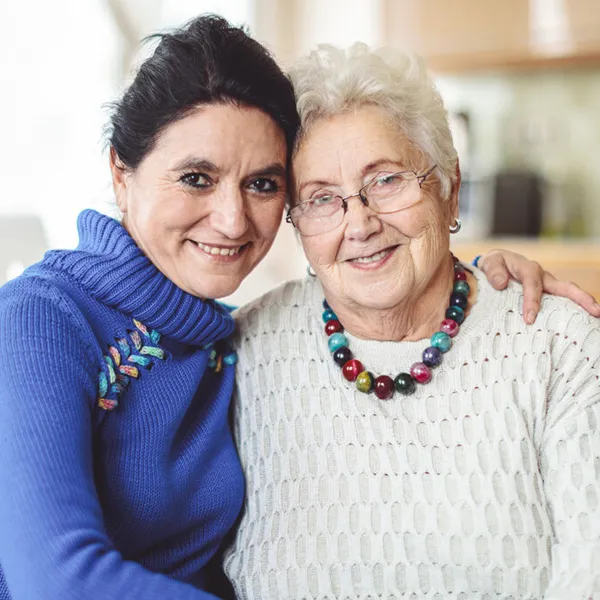
Your Gift Can Make 2x the Impact
Your Gift Can Make 2x the Impact
A gift can go twice as far during our February $100,000 2x Match. Your contribution by Feb. 27 will fuel Alzheimer’s research and help provide essential care and support.
Donate NowI joined the Alzheimer’s Association 24/7 Helpline team in July 2019 as a bilingual care consultant, providing support to callers in both English and Spanish. I hail from the Dominican Republic, where many of my family members still live today.
Helping Families Like Mine
At the Helpline, I’m lucky to work with some of the best people I've ever met: good, genuine, caring people who are dedicated to helping every caller. It is a huge release for callers to be able to talk to someone who cares, especially during the COVID-19 pandemic, when families have been isolated, with less socialization opportunities outside their home. I help with the logistical side of things, and the emotional support side. When care partners or caregivers are seeing less of their families and friends and more of symptoms of Alzheimer’s or other dementia in the person they love, the Helpline staff is always here and willing to help.Whether in English or Spanish, the types of calls we receive are so varied, ranging from callers concerned about mild, initial signs or symptoms of Alzheimer’s to crisis intervention, guiding people who need more immediate help. I help coach callers on how to best communicate with hospital or residential community staff, assist with care planning to get ahead of the financial cost of care of Alzheimer’s disease, and I connect callers to virtual educational programs and support groups in their area.
The Latinx community often has the mentality that care should be given at home, and stay at home. This collective care mentality, where a family of caregivers all pitch in to help, seems to have a lot to do with a lack of trust of the U.S. hospital system. When I was growing up in the Dominican Republic, I heard many inaccurate things about care options in America. Once I moved here, I realized that there are so many options outside the home that can be a potential fit for families unable to care for a loved one at home. Area agencies on aging, such as the National Hispanic Council on Aging (NHCOA), have Spanish speakers available to assist families, and there are even options for people who do not have the privilege of citizenship. The resources are out there! I urge the Latinx community to call the Helpline when they are in need; we have callers who speak Spanish staffed around the clock, so you will always have someone to talk to, confidentally.
My Personal Alzheimer’s Story
It feels so personal when I communicate with caregivers and people living with Alzheimer’s disease, since I have this personal connection through someone I love so much. I feel for these people, and I have empathy for everyone. I understand how people can become overwhelmed in their situation, and my communication with caregivers allows me to explain a situation from the perspective of someone who understands both how the brain functions and the challenges caregivers face.
My Heritage
Dominican food is amazing! There is a dish called sancocho, which is an incredible Dominican stew that my family would gather around the table to enjoy with each other when I still lived in the Dominican Republic.
My culture is very family and community-oriented. Family is the resource we have in our home country where there is not a lot of government funding or resources. Family, simply, is everything. There is something beautiful about how our genes keep us together.
My paternal grandfather is now showing memory concerns, and I find myself recalling those special moments where we connected over food. My whole family would join together every Sunday after church, a real feeling of togetherness. Eating together keeps us united, since every meal is four hours long, with us all talking through it! I would watch my grandfather reach back into his memory for stories from his childhood to share with all of us. Although he is beginning to repeat stories, new ones still find a way of surfacing over a shared meal. Food is really special in that way, how it brings people together in these shared, special moments.
In these trying times we are all living through, more and more people are experiencing anxiety at home. Care partners and caregivers with loved ones with dementia are in need of respite care, even in times of a pandemic, as are all people. It is important to take care of ourselves, and I do so by getting outside in nature, being active, participating in yoga and spending time with my partner and my cat — who goes on walks, too! We all need to find what works for us during these difficult times.
If someone you love is impacted by Alzheimer’s or another dementia, or if you are living with Alzheimer’s, call the Helpline when you need us (800.272.3900). We are here for you.
About Cristin: After relocating to the United States, Cristin received her undergraduate and master’s degrees in Colorado, studying at the University of Colorado Boulder and then completing her master’s degree in social work (MSW) at the University of Denver. After beginning in-person therapy work with college students at her university counseling center, she worked as a child therapy expert before becoming a dementia care consultant.
Related articles:
Encuentre una delegación (Find your local chapter, content in Spanish)
Línea de Ayuda 24/7 (24/7 Helpline, content in Spanish)
